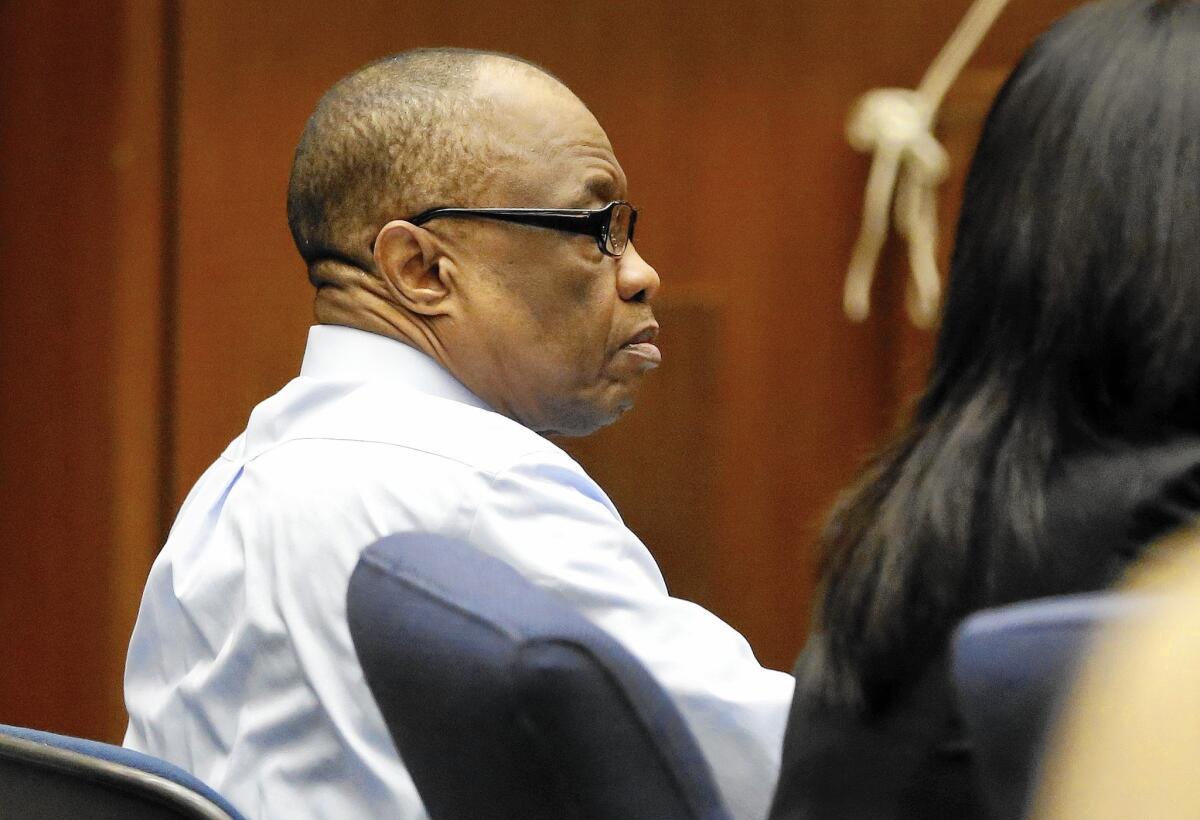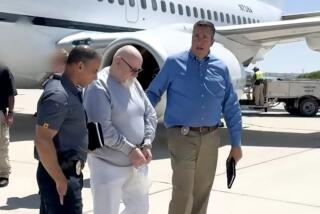Medical examiner describes victims’ wounds in Grim Sleeper trial

Lonnie Franklin Jr., 63, faces 10 counts of murder in the Grim Sleeper killings.
Los Angeles County’s chief medical examiner detailed gruesome wounds suffered by victims of the so-called Grim Sleeper serial killer, as testimony continued Wednesday in the trial of a former police garage attendant accused of the slayings.
Coroner Mark Fajardo described to jurors in a downtown Los Angeles courtroom the autopsy reports of eight of the ten women, beginning with Debra Jackson, a 29-year-old waitress who was discovered in 1985 shot in the chest in an alley and is believed to be the serial killer’s first victim.
Lonnie Franklin Jr. faces 10 counts of murder in the killings of nine women and a 15-year-old girl spanning more than 20 years. He also faces one count of attempted murder.
Franklin, 63, has pleaded not guilty.
Fajardo was called to testify about his review of autopsies conducted by medical examiners who have since died or are unable to testify.
Guided by Deputy Dist. Atty. Beth Silverman through decades-old documents, Fajardo testified that seven of the victims died from gunshot wounds to their chest, one was strangled, and another suffered both strangulation and gunshot wounds.
Fajardo also testified that the trajectory of the bullets was consistent with the victims sitting in the passenger seat of a vehicle, while their assailant sat in the driver’s seat. That is the method Silverman has alleged Franklin used in the killings.
Before discussing the autopsy of 18-year-old Alicia Alexander, Silverman warned the victim’s mother and father. The parents walked out of the courtroom before the grisly photos of their daughter on a coroner’s table were displayed in court.
On Tuesday, the jury heard testimony from two other forensic pathologists, who detailed autopsies they conducted on 15-year-old Princess Berthomieux and Janecia Peters, 25, who was found inside a trash bag in a Dumpster.
Former LAPD Det. Dennis Kilcoyne, who testified on Tuesday, said it was Peters’ 2007 slaying that prompted the search for a serial killer after the attacker’s DNA matched two earlier cases.
The match helped investigators identify a common pattern, Kilcoyne told the jury.
All three victims were young, black women who lived in the same area of the city. All of their bodies were discarded.
“We’ve got somebody killing young ladies in South Los Angeles,” Kilcoyne recalled saying at the time.
The DNA match eventually would lead to the arrest of Franklin, a local backyard mechanic and former Los Angeles police garage attendant, who was arrested in 2010.
Kilcoyne, who is expected to continue testimony on Thursday, said the connection made between the victims in 2007 led to the creation of a task force to investigate the three killings, as well as a mandate to expand the search for related cases.
A series of killings in the 1980s soon emerged as sharing similar circumstances.
Eventually, investigators began matching DNA from the 1980s killings to the more recent deaths.
The apparent gap in time from the earlier cases to the later ones led to the serial killer being dubbed the “Grim Sleeper.”
In 2008, officials collected DNA data from state prisoners but were unsuccessful in finding a match with that of the Grim Sleeper.
A year later, then-Atty. Gen. Jerry Brown approved a new technique called a “familial search” that allowed officials to check whether a crime suspect’s DNA partially matches that of anyone in the state’s offender DNA database.
The search came up with a name: Christopher Franklin. His father was Lonnie Franklin Jr.
Police began following the elder Franklin, and a detective, posing as a busboy, collected a half-eaten pizza crust, fork, napkin, drinking glass and cake crumbs discarded by Franklin at a restaurant.
During her opening statement Tuesday, Silverman said that all of the victims were connected to Franklin either by DNA, firearm evidence or both.
Fajardo will return on Thursday for cross-examination by Franklin’s attorneys.
Twitter: @sjceasar
ALSO
2 LAPD officers are charged with sexually assaulting women while on duty
Sentenced to prison for assault, teenage ‘parachute kids’ deliver warning to adults in China
Hollywood hospital pays $17,000 in bitcoins to hackers who took control of computers
More to Read
Sign up for Essential California
The most important California stories and recommendations in your inbox every morning.
You may occasionally receive promotional content from the Los Angeles Times.











